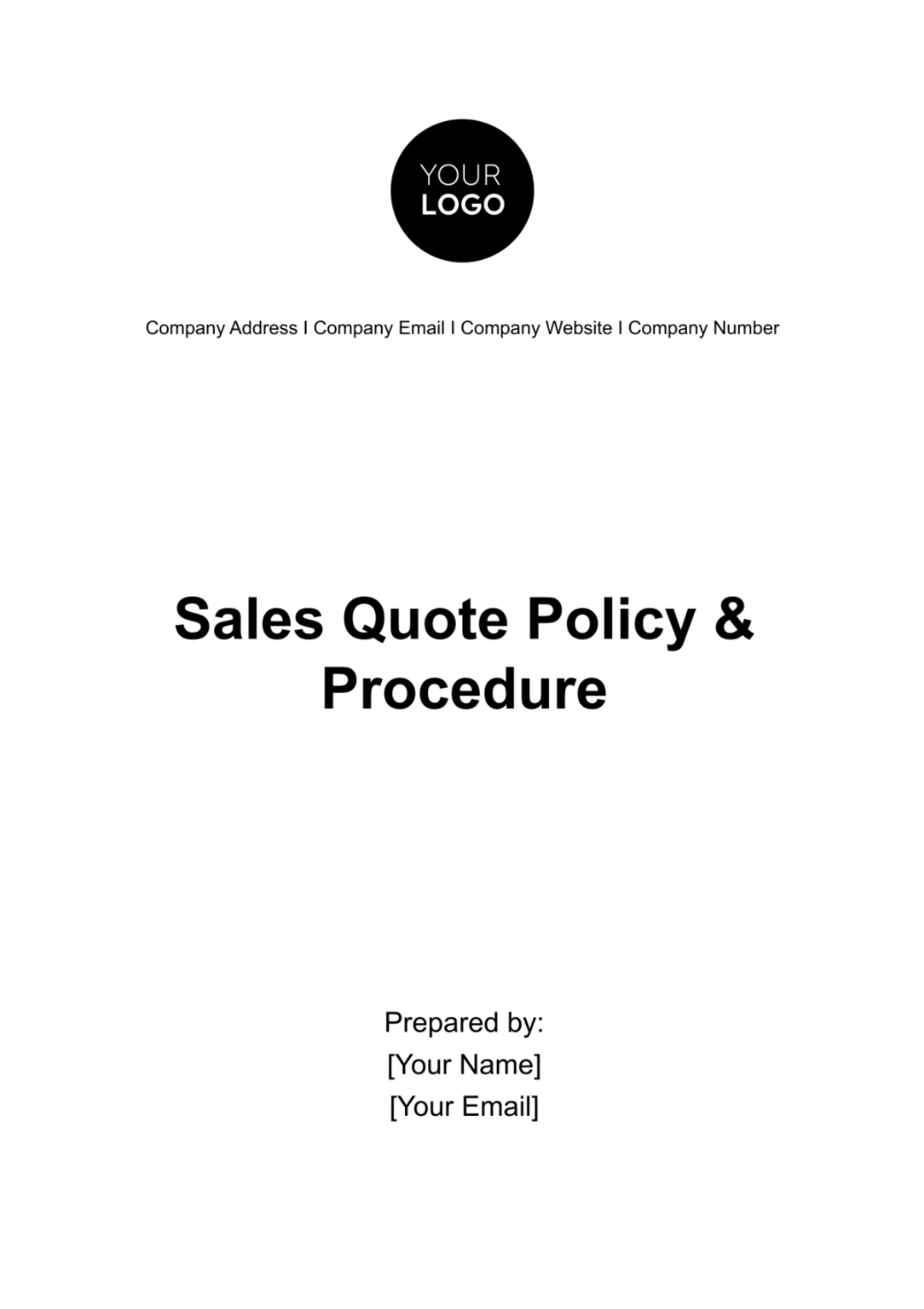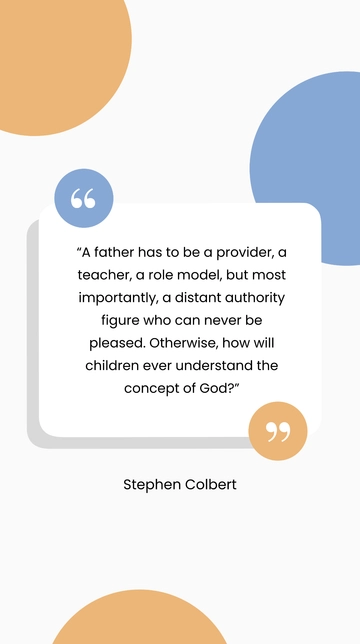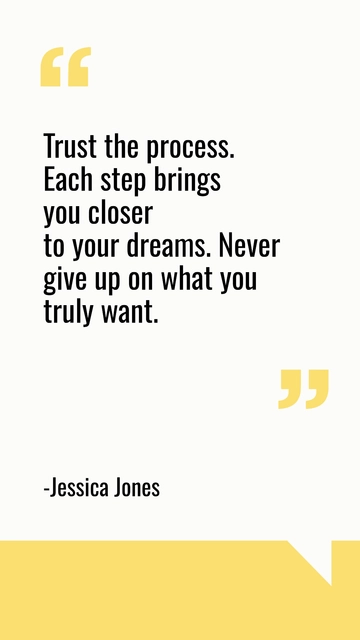Free Sales Quote Policy & Procedure

Policy Number: [000-000]
Effective Date: [Month Day, Year]
I. POLICY STATEMENT
The Policy Statement is designed to provide comprehensive guidance for the standardized and effective management of sales quotes within [Your Company Name]. This policy aims to ensure the integrity, accuracy, and professionalism of all quotes issued by the Sales Department. It sets forth a systematic procedure from the initial stage of gathering prospect requirements to the final steps of quote delivery and follow-up. The primary objectives are to maintain consistency in the pricing and presentation of our products or services, ensure proper documentation and record-keeping, and enhance customer satisfaction through transparent and efficient communication.
By adhering to this policy, [Your Company Name] aspires to uphold its reputation for high-quality products and excellent customer service, thereby increasing the likelihood of sales conversion and fostering long-term relationships with clients. Additionally, the implementation of this policy supports compliance with legal and regulatory standards, thereby mitigating risks related to financial reporting and contractual obligations.
II. SCOPE
The scope of this policy encompasses all individuals within [Your Company Name] who are directly or indirectly involved in the process of generating, delivering, and managing sales quotes. All personnel must understand that the procedures outlined in this policy are not merely departmental guidelines but are part of a broader organizational framework designed to optimize revenue generation and customer satisfaction.
III.DEFINITIONS
The definitions in this section aim to provide clarity and a shared understanding of the terminology used throughout this policy document. These terms are critical to the proper interpretation and implementation of the sales quote management process at [Your Company Name].
A. Sales Quote
A formal, written document generated by [Your Company Name] that provides a comprehensive breakdown of the price, terms, and conditions under which the company is willing to offer its products or services to a prospect or existing customer. The document is the basis for subsequent contractual agreements should the prospect decide to proceed.
B. Prospect
An individual or organization that has expressed a preliminary interest in acquiring the company’s products or services but has not yet entered into a formal agreement. Prospects can originate from various channels such as inbound inquiries, referrals, or outbound sales activities.
C. SKU (Stock Keeping Unit)
A unique alphanumeric identifier that represents a distinct product or service offering in the company's inventory. The SKU is used for tracking, reporting, and inventory management purposes.
D. CRM (Customer Relationship Management)
A specialized software platform utilized by the company to manage all interactions with prospects and customers. The CRM system plays an integral role in the sales quote process by capturing and storing critical data, tracking the status of quotes, and providing an audit trail for compliance purposes.
E. Special Pricing
Any deviation from the standard pricing table, generally used for high-volume deals, strategic partnerships, or promotional offers. Special pricing scenarios necessitate additional levels of approval and documentation.
F. Audit Trail
A secure, chronological record of actions and changes made to a sales quote, stored within the CRM system. The audit trail serves as evidence for compliance with this policy and for resolving any discrepancies that may arise.
G. Quote Expiration
The predetermined period, usually 30 days from the issue date, during which the terms outlined in a sales quote remain valid. After the expiration date, a quote must be reviewed, updated, and re-approved before being reissued to the prospect.
H. Follow-up
The action of contacting a prospect after delivering a sales quote to address any questions, negotiate terms, or guide the prospect toward conversion. Follow-up activities should be conducted within a specified time frame and recorded in the CRM system.
By standardizing the terminology used in this policy, the company ensures that all employees involved in the sales quoting process have a consistent and clear understanding of their roles, responsibilities, and procedures to be followed. This fosters effective communication and collaboration among departments, thereby facilitating a more efficient and error-free quoting process.
IV. PROCEDURES
This part provides a systematic and detailed guide for executing each stage of the sales quote management process within [Your Company Name]. Adherence to these procedures is obligatory for ensuring optimal results in revenue generation, customer satisfaction, and compliance with internal and external standards.
A. Quote Creation
Gather Information: Engage with the prospect through meetings, phone calls, or emails to acquire comprehensive information on their requirements. This includes specifics on the type of products or services they are interested in, required quantities, and any customization or special considerations. Document these details meticulously in the CRM system for future reference.
Pricing Structure: Utilize the most recent pricing table, exemplified in Table 1, to determine unit pricing for each product or service (SKU) included in the quote. Factor in any applicable discounts or special pricing considerations by company policy.
SKU | Product Name | Base Unit Price |
001-PD | Product A | $50 |
CRM Entry: Record all relevant data, including prospective deal value and the SKU details, in the CRM system for tracking and future reference. Attach any correspondence or documentation that may influence the quote or future interactions with the prospect.
B. Quote Review
Initial Review: Before disseminating the sales quote, it must undergo a comprehensive review by the Sales Manager for accuracy, completeness, and alignment with company policies and objectives.
Special Pricing Authorization: In instances where the quote includes special pricing, promotions, or customizations, obtain written approval from the Finance Department. Document this approval in the CRM system to maintain a complete audit trail.
C. Quote Delivery
Formatting Consistency: Prioritize adherence to the company's established quote template to maintain brand consistency and professionalism. Ensure that all details, including terms and conditions, are clearly outlined.
Email Protocol: Forward the approved quote to the prospect via a secure and professional email, ensuring that the email body contains an overview of the quote's contents. Document this activity in the CRM to maintain a complete interaction history.
Follow-up Strategy: Plan and schedule a follow-up interaction within 48 hours of quote delivery to resolve any queries, negotiate terms if necessary, and guide the prospect toward a decision.
D. Record-Keeping
Documentation Storage: Retain a digital copy of all issued sales quotes within the CRM system, setting their respective statuses as 'Accepted,' 'Rejected,' or 'Pending,' based on the prospect's response.
Audit Trail Maintenance: Keep an ongoing, detailed audit trail for each quote, noting all revisions, approvals, and rejections. This ensures transparency and aids in any internal or external audits.
E. Quote Expiration
Indicate that all quotes are valid for a stipulated period, typically 30 days from the issuance date. Post expiration, the quote should be reviewed and updated to reflect current pricing and terms.
By following these enhanced procedures, the company aims to standardize its sales quote management process across all departments and personnel involved. This ensures that the company operates with utmost efficiency, accuracy, and professionalism, thereby maximizing revenue opportunities and strengthening relationships with prospects and clients.
V. COMPLIANCE
The Compliance section outlines the consequences of non-adherence to the established procedures and guidelines stipulated in this Sales Quote Management Policy. Ensuring compliance is essential for maintaining the integrity of [Your Company Name]'s business practices, fostering customer trust, and fulfilling legal and contractual obligations.
A. Internal Audits
Routine Monitoring: The Compliance Department will conduct periodic internal audits to ensure that the procedures for sales quote management are consistently followed. Findings will be reported to senior management for review and action.
Documentation: All relevant documentation, including approvals for special pricing, quote revisions, and audit trails, must be readily available for internal and external audits. Failure to provide adequate documentation may result in corrective actions.
B. Disciplinary Actions
First Violation: A first-time violation of this policy may result in a formal warning and mandatory retraining on the Sales Quote Management Policy.
Subsequent Violations: Repeated failure to comply with this policy may result in more severe disciplinary actions, including but not limited to, temporary suspension, financial penalties, or termination of employment.
C. Legal and Contractual Implications
Contractual Obligations: Failure to adhere to the guidelines set forth in this policy may jeopardize the enforceability of the sales quotes and result in contractual disputes, potentially leading to legal action against [Your Company Name].
Regulatory Compliance: Non-compliance may also expose the company to regulatory penalties, including fines or sanctions, particularly if the non-compliance is related to financial misrepresentation or fraudulent activities.
D. Reporting and Whistleblowing
Reporting Mechanism: Employees are encouraged to report any violations or discrepancies they observe in the sales quote management process through the company's confidential whistleblowing channel.
Protection Against Retaliation: [Your Company Name] assures that employees who report violations in good faith will be protected from retaliation in accordance with the company’s Whistleblower Policy.
By instituting strict compliance measures, [Your Company Name] aims to enforce the Sales Quote Management Policy effectively and to mitigate associated risks. These compliance guidelines not only establish a framework for internal oversight but also ensure that the organization adheres to the highest standards of business conduct, thereby safeguarding its reputation and financial standing.
VI. CONTINUOUS IMPROVEMENT AND REVIEW
This part is integral to maintaining the ongoing efficacy and relevance of the Sales Quote Management Policy at [Your Company Name]. It outlines the mechanisms for updating this policy in alignment with business changes, regulatory requirements, and technological advancements.
A. Periodic Review
Frequency: This policy will undergo a comprehensive review annually, or as required by significant changes in business operations or legal frameworks. The review will be conducted by a cross-functional team comprising representatives from the Sales, Compliance, Finance, and Legal Departments.
Criteria for Review: The review will take into consideration key performance indicators related to sales conversions, customer satisfaction rates, and internal audit findings. Any identified gaps or inefficiencies will be addressed in the updated policy.
B. Feedback Loop
Employee Feedback: Employees are encouraged to provide feedback on the utility and clarity of this policy through established internal channels. Constructive feedback is essential for identifying areas that may require refinement or clarification.
Customer Feedback: Customer feedback related to the sales quote process may also be collected through surveys or direct interactions. This external feedback will be analyzed to make client-centric improvements to the policy.
C. Technology Assessment
Software Tools: Periodically assess the suitability and efficiency of the CRM and other software tools used in the sales quote management process. Upgrades or changes to these systems should be aligned with the policy's objectives and should not compromise compliance standards.
Integration with Other Systems: Ensure that any technological changes or software integrations are compatible with existing data storage and reporting mechanisms. Thorough testing should precede the deployment of any new systems.
D. Documentation and Communication
Change Log: Maintain a detailed change log that records all modifications to this policy, including the date of the change and the personnel involved in the review and approval process.
Policy Dissemination: Whenever the policy is updated, disseminate the revised document to all relevant departments and personnel. Provide additional training sessions as required to ensure comprehensive understanding and implementation.
VII. CONCLUSION
This Policy serves as a comprehensive framework that standardizes and governs the creation, approval, delivery, and management of sales quotes within [Your Company Name]. This policy aims to optimize operational efficiency, maximize revenue, ensure compliance with regulatory requirements, and enhance customer satisfaction. Adherence to this policy is mandatory for all applicable personnel and departments, and non-compliance will be subject to disciplinary action as outlined.
VIII. APPROVAL
This policy has been approved by:
[Signature]
[Approver’s Name]
[Job Title/Position]
[Your Company Name]
[Month Day, Year]
- 100% Customizable, free editor
- Access 1 Million+ Templates, photo’s & graphics
- Download or share as a template
- Click and replace photos, graphics, text, backgrounds
- Resize, crop, AI write & more
- Access advanced editor
Establish clear policies and procedures for your sales quotes with the Sales Quote Policy & Procedure Template only here on Template.net! This editable and customizable document, which can be easily modified using our user-friendly AI Editor Tool, provides a comprehensive guide for sales quote policies and procedures, promoting effective sales practices!
You may also like
- Inspirational Quotes
- Motivational Quotes
- Inspirational For Work Quotes
- Inspirational For Women Quotes
- Funny Inspirational Quotes
- Inspirational About Life Quotes
- Life Quotes
- Inspirational For Students Quotes
- Inspirational For Kids Quotes
- Inspirational For Men Quotes
- Positive Quotes
- Love Quotes
- Funny Quotes
- Famous Quotes
- Mothers Day Quote
- Short Quotes
- Good Morning Quotes
- Valentines Day Quotes
- Family Quotes
- Christmas Quotes
- Encouraging Quotes
- Friendship Quotes
- Kindness Quotes
- Graduation Quotes
- Leadership Quotes
- Motivational For Work Quotes
- Bible Quotes
- Maya Angelou Quotes
- Marcus Aurelius Quotes
- Sad Quotes
- Birthday Quotes
- Success Quotes
- Self Love Quotes
- Travel Quotes
- Grief Quotes
- Fathers Day Quotes
- Relationship Quotes
- Depression Quotes
- Anniversary Quotes
- Friday Quotes
- New Year Quotes
- Monday Quotes
- Teamwork Quotes
- Movie Quotes
- Black History Month Quotes
- Shakespeare Quotes
- Mark Twain Quotes
- Memorial Day Quotes
- Thanksgiving Quotes
- Education Quotes
- Martin Luther King Jr Quotes
- Easter Quotes
- Albert Einstein Quotes
- Mom Quotes
- Music Quotes
- Work Quotes
- Encouragement Quotes
- Teacher Quotes
- Christian Quotes
- Daughter Quotes
- Winston Churchill Quotes
- Peace Quotes
- Spring Quotes
- Nature Quotes
- Strength Quotes
- Fall Quotes
- Confucius Quotes
- Dog Quotes
- Thank You Quotes
- Hard Work Quotes
- Summer Quotes
- Hope Quotes
- James Baldwin Quotes
- Healing Quotes
- Oscar Wilde Quotes
- Appreciation Quotes
- 4Th Of July Quotes
- Adventure Quotes
- Anxiety Quotes
- Architecture Quotes
- Awareness Quotes
- Beach Quotes
- Beauty Quotes
- Blessed Quotes
- Breakup Quotes
- Canada Quotes
- Children Quotes
- Chinese Quotes
- Coffee Quotes
- Columbus Quotes
- Compliment Quotes
- Confidence Quotes
- Dussehra Quotes
- Faith Quotes
- Fashion Quotes
- Festival Quotes
- Fitness Quotes
- Forgiveness Quotes
- Friendship Day Quotes
- Good Friday Quotes
- Grandparents Quotes
- Gratitude Quotes
- Halloween Quotes
- Happiness Quotes
- Holi Quote
- Holiday Quotes
- Human Rights Quotes
- I Miss You Quotes
- Independence Day Quotes
- India Republic Day Quotes
- Inspiration Quotes
- Janmashtami Quote
- Labor Day Quote
- Language Quotes
- Letting Go Quotes
- Lifestyle Quotes
- Loyalty Quotes
- Massage Quotes
- May Day Quotes
- Milad Un Nabi Quotes
- Moving On Quotes
- Muharram Quotes
- Pongal Quotes
- Prayer Quotes
- Pride Month Quotes
- Raksha Bandhan Quote
- Ramadan Quotes
- Remembrance Quotes
- Respect Quotes
- Retirement Quotes
- Singles Quotes
- Sisters Day Quotes
- Small Business Quotes
- Sports Quotes
- Startup Quotes
- Trust Quotes
- Ugadi Quote
- Vacation Quotes
- Winter Quotes
- Women Quotes
- Yoga Quotes





























